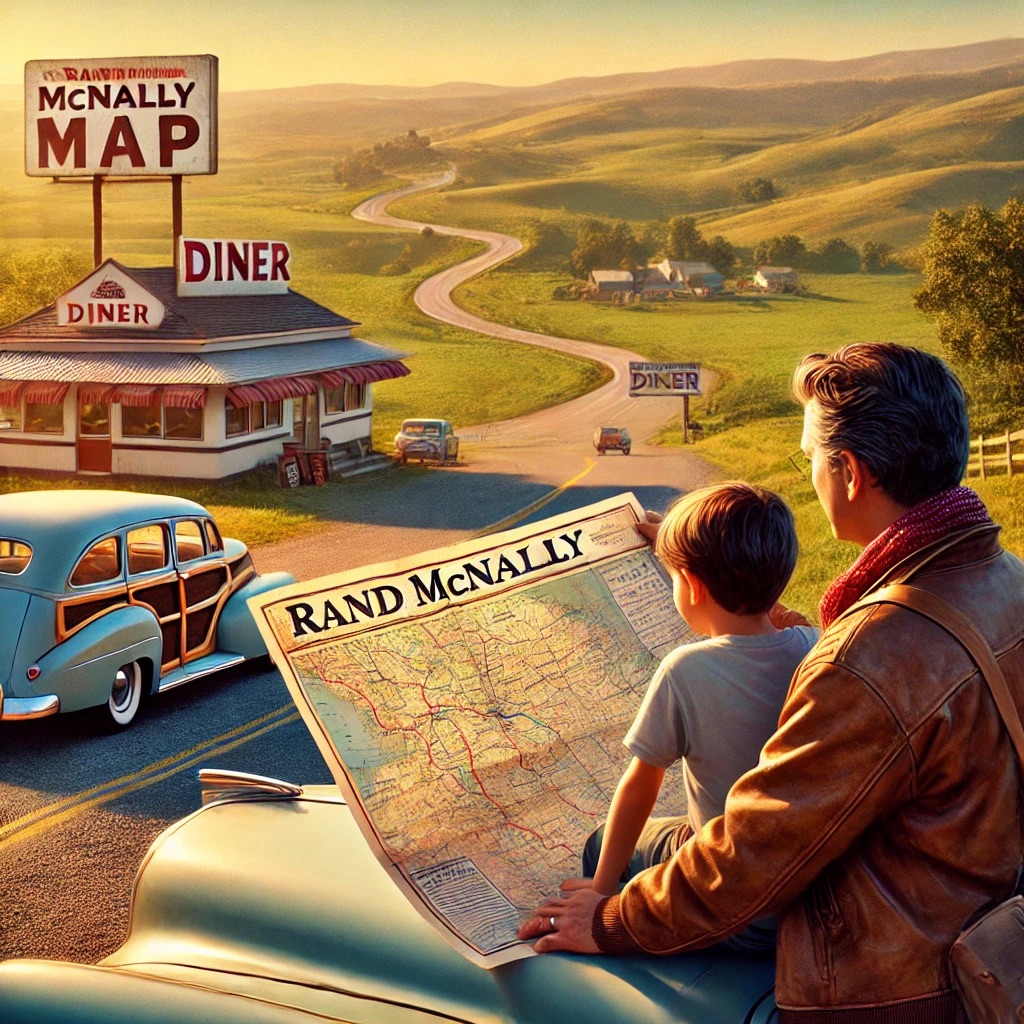I remember a time when traveling somewhere new required more than a smartphone app. It required a physical map—one that you could fold (though rarely correctly), mark up, and carry in the glove compartment. My dad had his trusty Rand McNally atlas, its pages dog-eared and creased from years of use. It was his go-to navigation tool, even when the roads didn’t match up anymore.
Sometimes, we’d find that a road marked as two-way had become one-way or had disappeared entirely. Those moments could be frustrating—and, at times, unsafe—but they taught us something valuable: the world doesn’t stay still. Roads change, businesses move, and landscapes transform.
One of my friends seemed ahead of the curve; their family would stop at AAA for turn-by-turn directions printed fresh for the trip. Still, even those could be flawed. I remember a road in Tennessee that just… ended. No signs, no detours, just a quiet realization that the map didn’t quite match reality.
Later, as technology evolved, paper maps gave way to portable GPS units. These gadgets promised updates via CD-ROM, but you still had to make the effort to keep them current. And now, we’ve reached the age of smartphones, with real-time traffic updates, route suggestions, and even warnings about speed traps. Technology has made navigation easier than ever. But the lessons from those old maps stick with me, and they resonate far beyond road trips.
Here’s what those maps taught me about life—and particularly about mental health:
1. Old Maps Can Mislead
Just because you know where something is—or where it used to be—doesn’t mean you’re on the right path. Roads change, and so do people, ideas, and understanding. This applies especially to how we view mental health.
When I was diagnosed with fibromyalgia—a condition many desert combat vets came home with—a friend advised me to keep it quiet. “People think it’s just a made-up disease,” they said. And they weren’t wrong; the stigma around fibromyalgia was real.
But just because an old map (or outdated medical understanding) said one thing doesn’t make it true. Science evolves. We now know that fibromyalgia is very real—and very painful. Similarly, mental health diagnoses that were once dismissed or misunderstood are now better understood thanks to advances in research.
We need our doctors, therapists, and ourselves to look at the old maps for context but rely on updated tools to guide us forward. Sometimes, that means acknowledging that what we thought we knew—about mental health, chronic illness, or even ourselves—needs to be reexamined.
2. Change Isn’t Always a Bad Thing
It’s easy to romanticize the “good old days.” I’ve heard people grumble that their neighborhood is going downhill or that things just aren’t like they used to be. Sometimes they’re right, but often, it’s just a matter of perspective.
When I was younger, I couldn’t understand why some streets changed from two-way to one-way. It felt inconvenient and unnecessary. But as I grew older, I started to see the logic—safer traffic flow, better organization, and sometimes just adapting to a growing population.
The same is true for society. Names, directions, and even ways of thinking may change, and while it’s easy to resist, stepping back and reflecting can reveal why those changes are happening. It doesn’t mean we have to accept every change without question, but it does mean approaching the new with curiosity instead of hostility. If your new neighbors agree that something isn’t working, maybe that’s a sign to work together on a solution instead of holding tightly to the past.
3. Balance Both Maps and GPS
While I love the convenience of modern GPS navigation, I’m grateful that I know how to read a paper map. There’s a sense of independence and preparation that comes with it. Technology can fail—batteries die, signals drop—and in those moments, the old skills come in handy.
In life, this balance is critical. We need to understand and respect where we came from while staying open to new tools, ideas, and approaches. Whether it’s navigating a road trip or navigating a mental health journey, having both a “map” (past wisdom) and “GPS” (modern innovation) can be invaluable.
Lessons for the Road Ahead
The evolution from paper maps to smartphone apps mirrors the way we grow as individuals and as a society. It’s a reminder that clinging to the old for comfort can hold us back, but so can dismissing it entirely.
For me, those maps taught me three things:
• Stay updated, because what you think you know might no longer be true.
• Embrace change, because it often leads to growth.
• Preserve old skills, because they may serve you when you least expect it.
As we navigate life’s winding roads, let’s remember to stay adaptable, curious, and grounded. Whether it’s a literal journey or a metaphorical one, the lessons we carry can help us find our way.
As always; See you out there, map in one hand and GPS in the other.
Discover more from Inside the mind of Wade
Subscribe to get the latest posts sent to your email.

